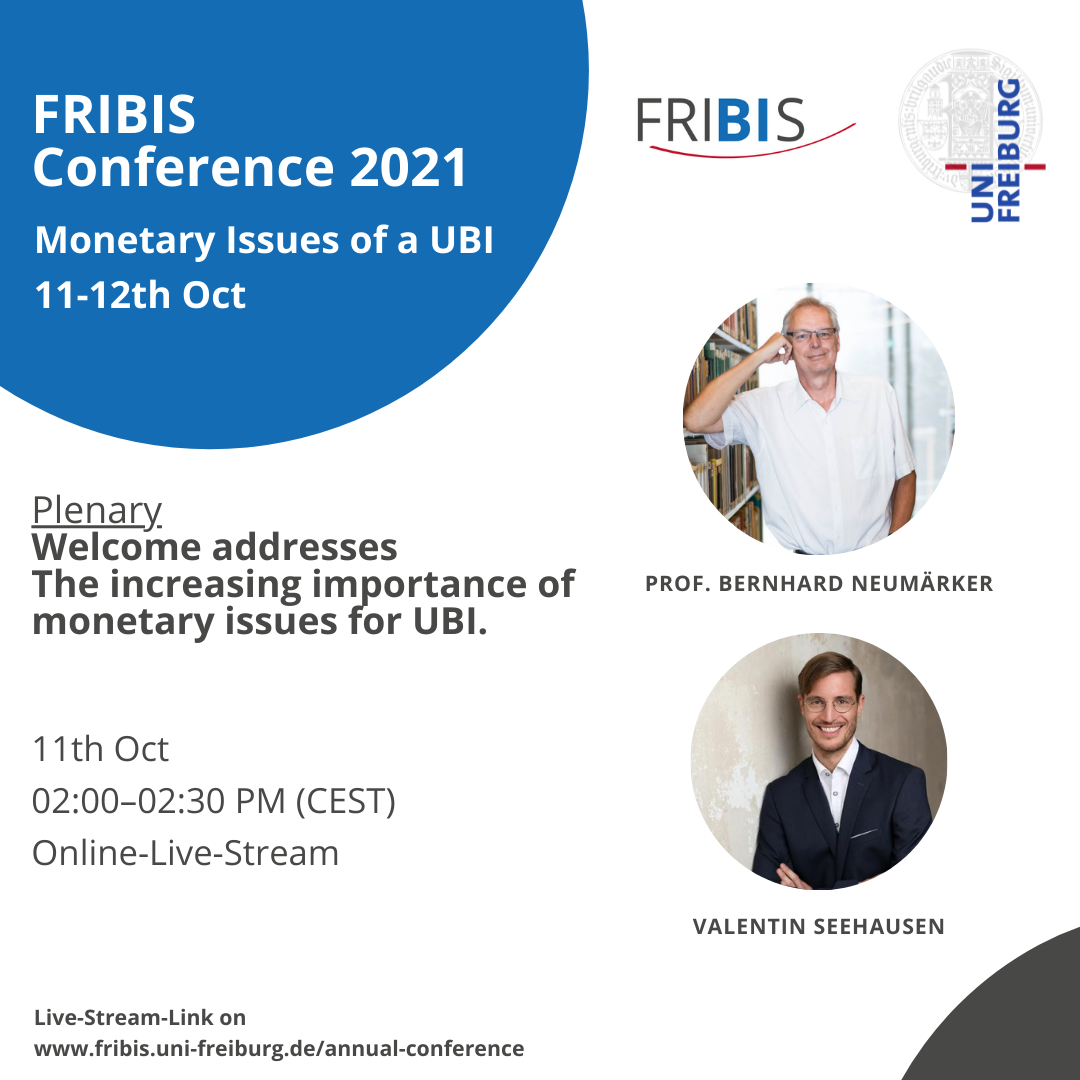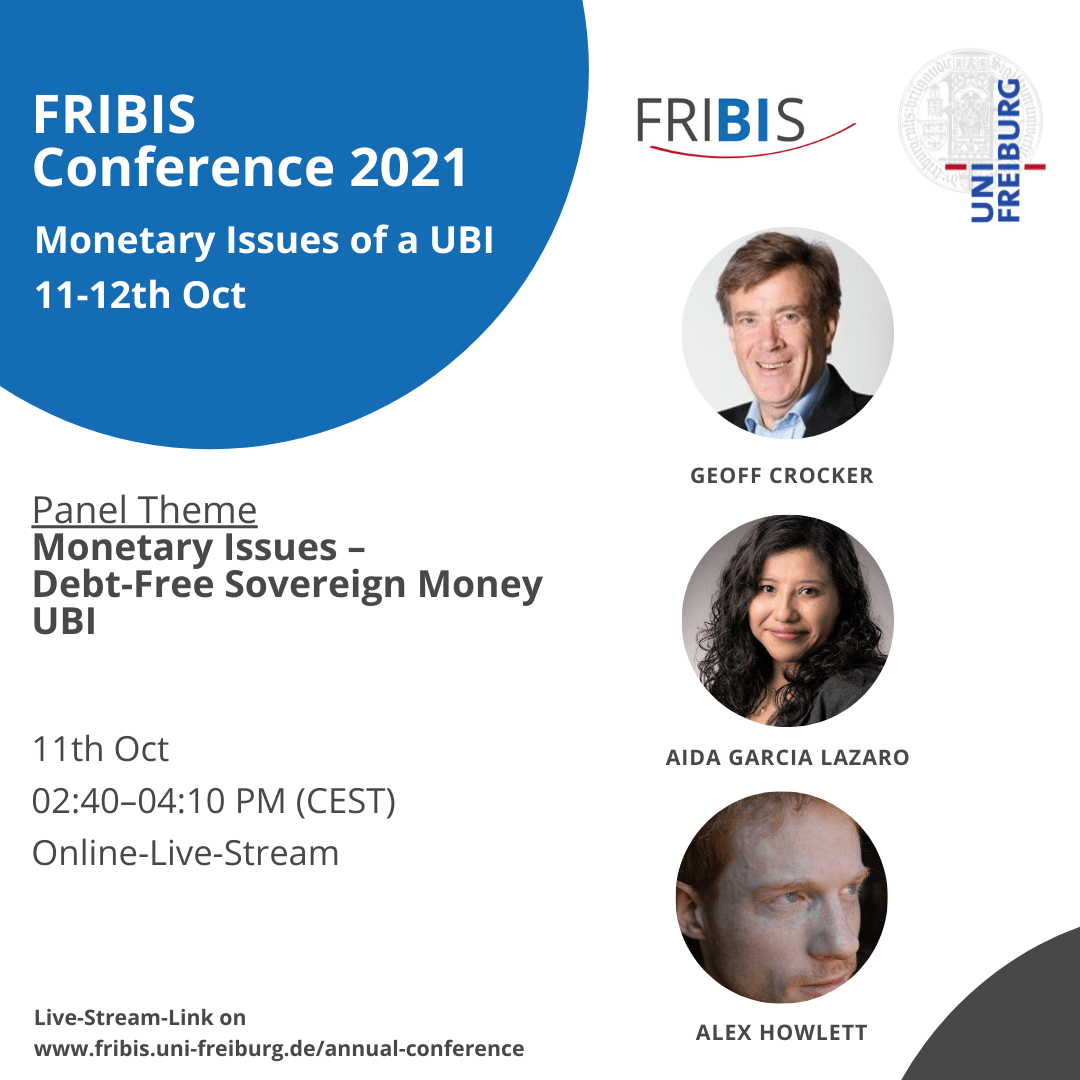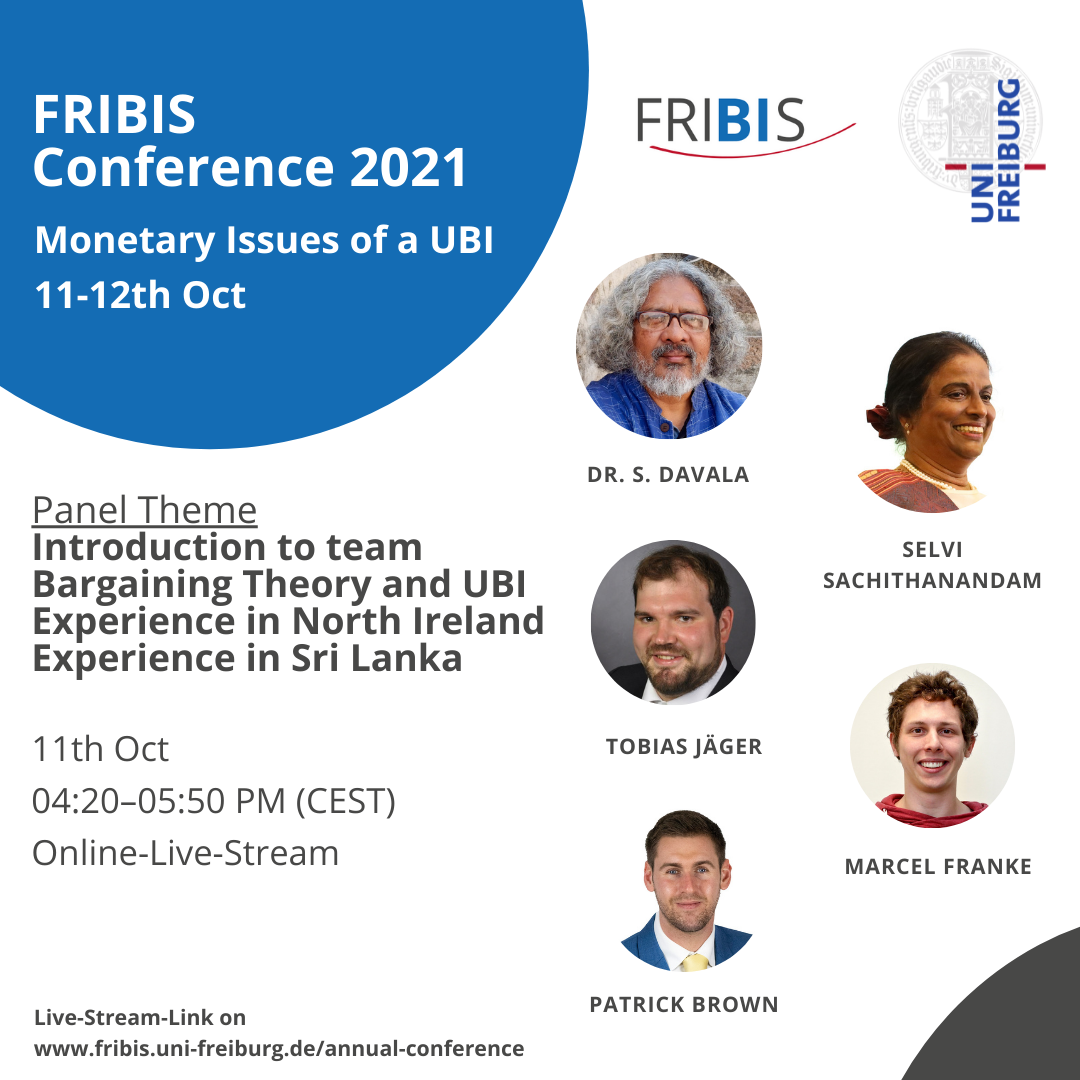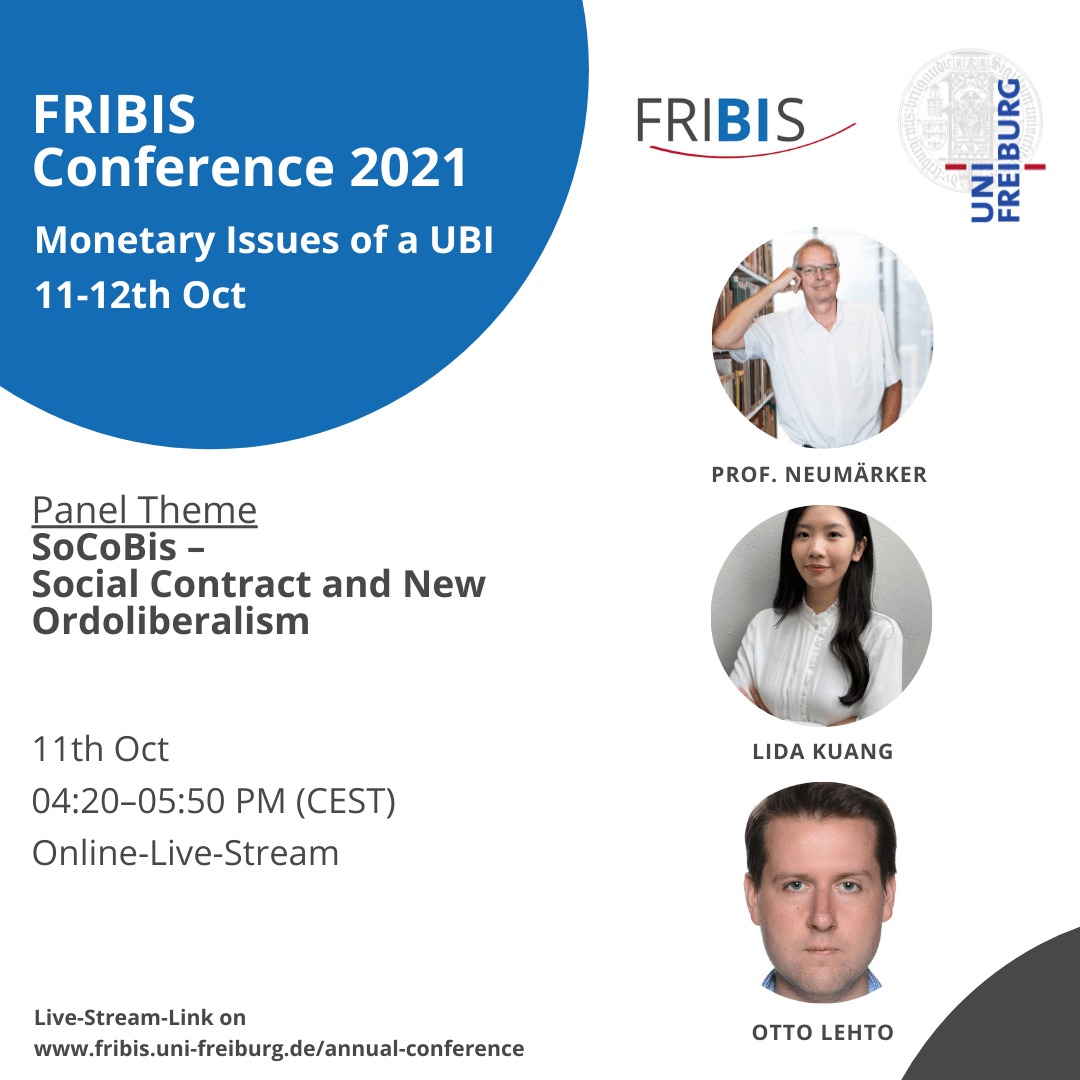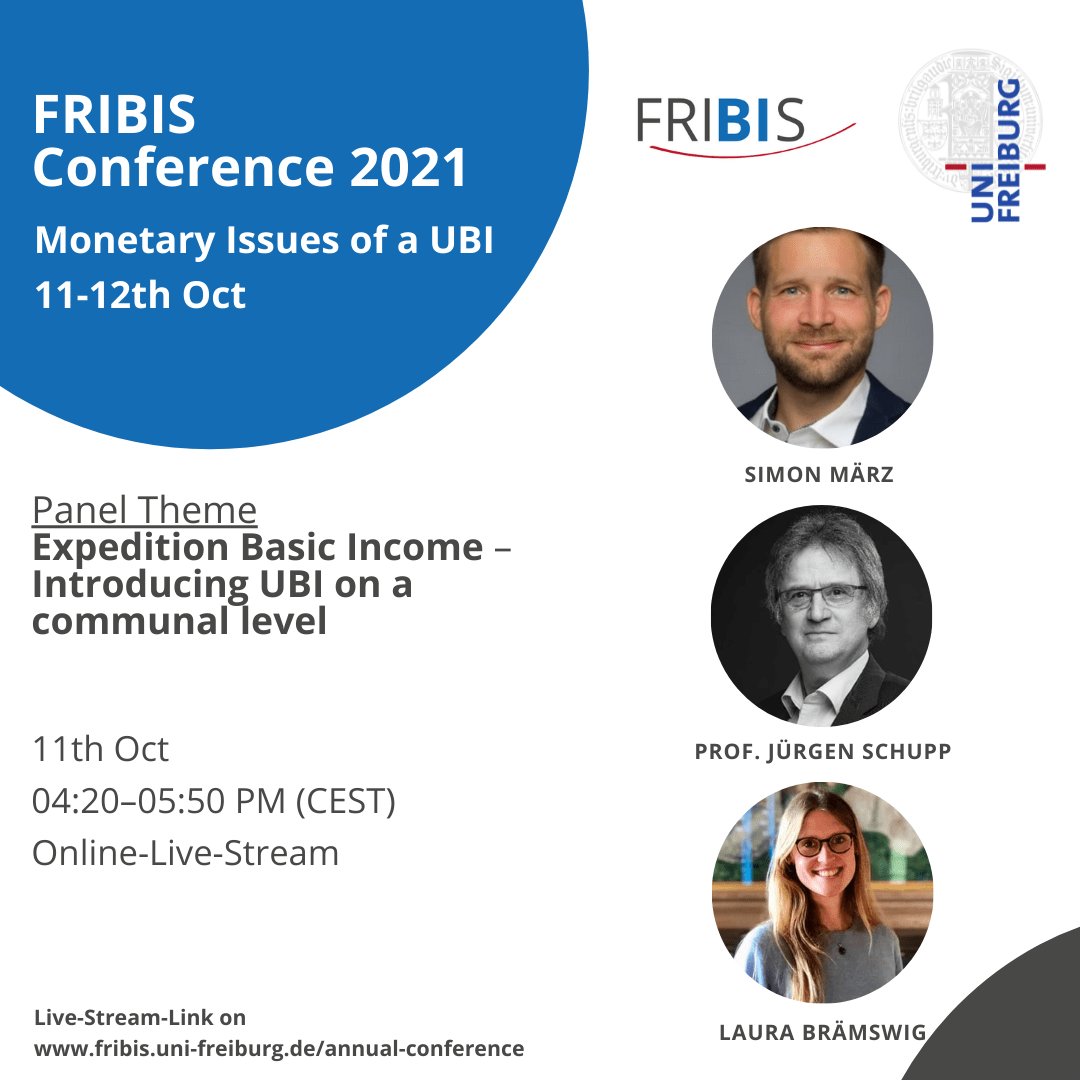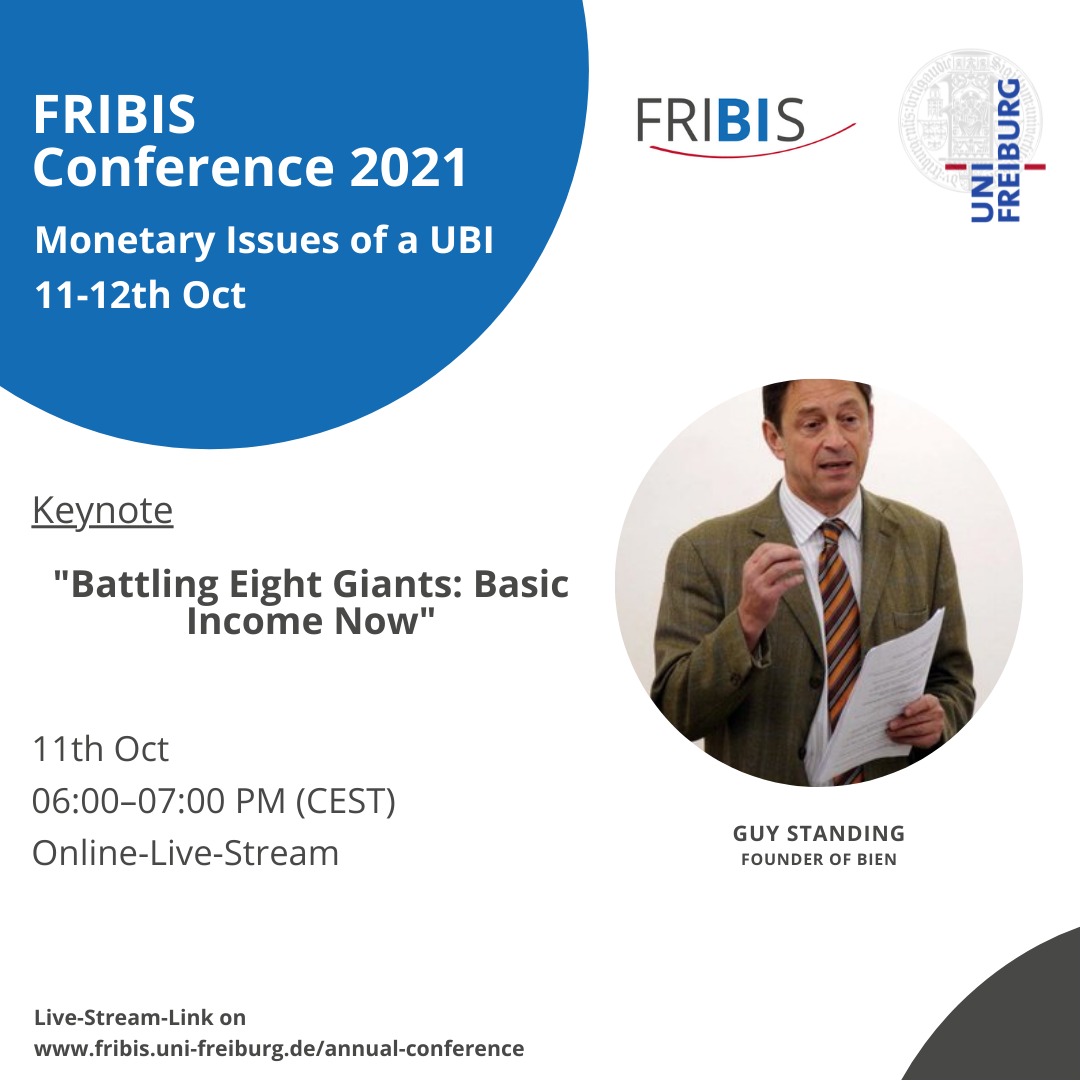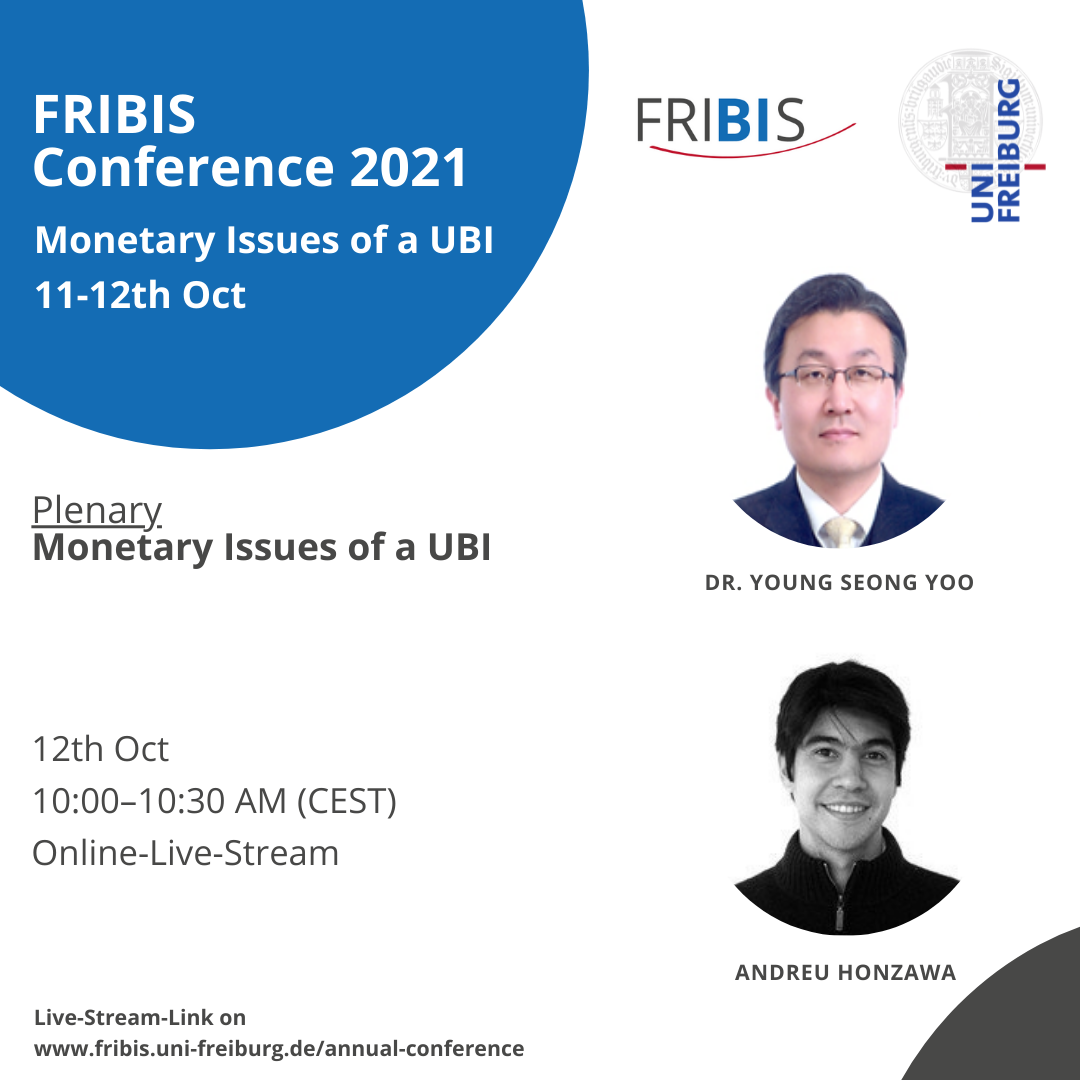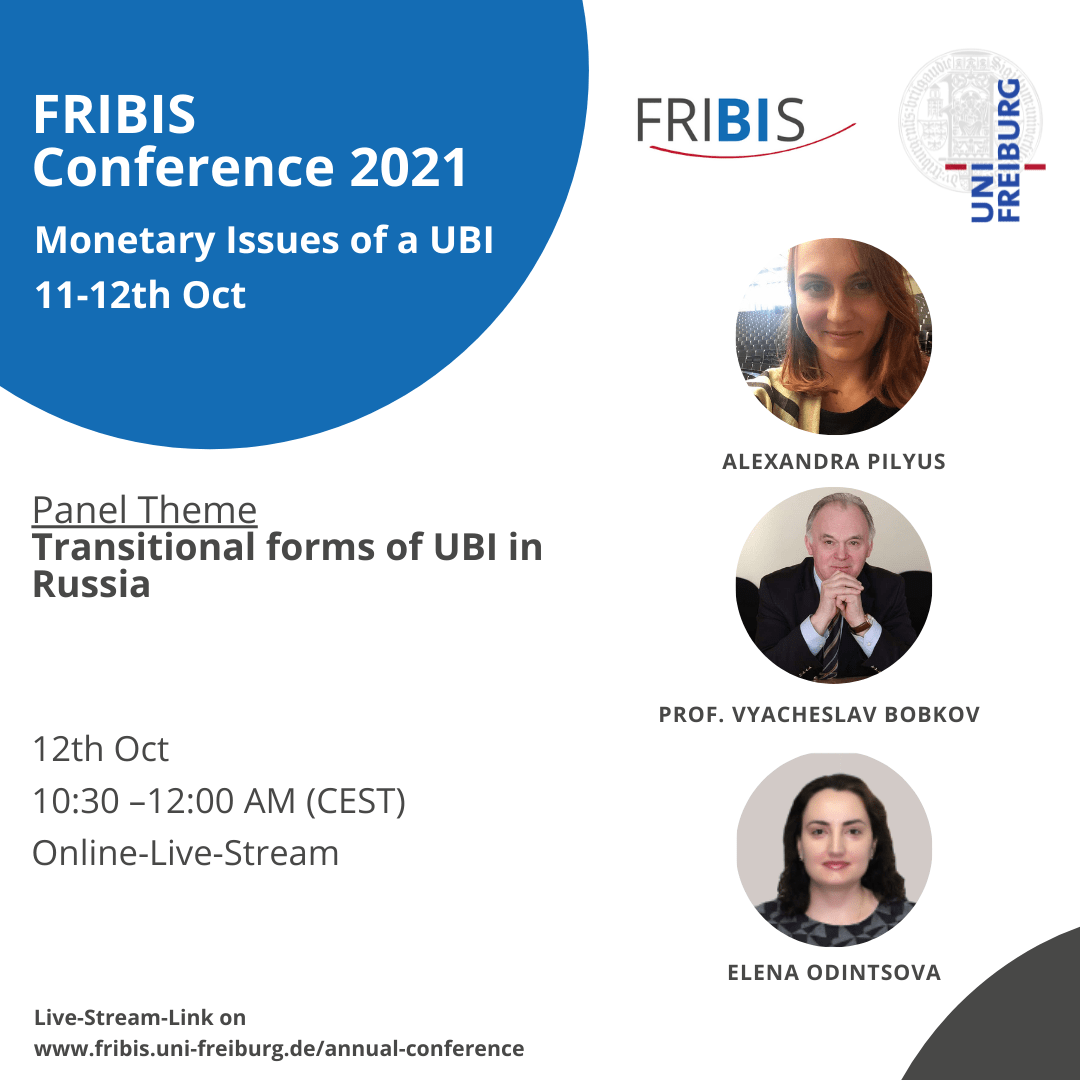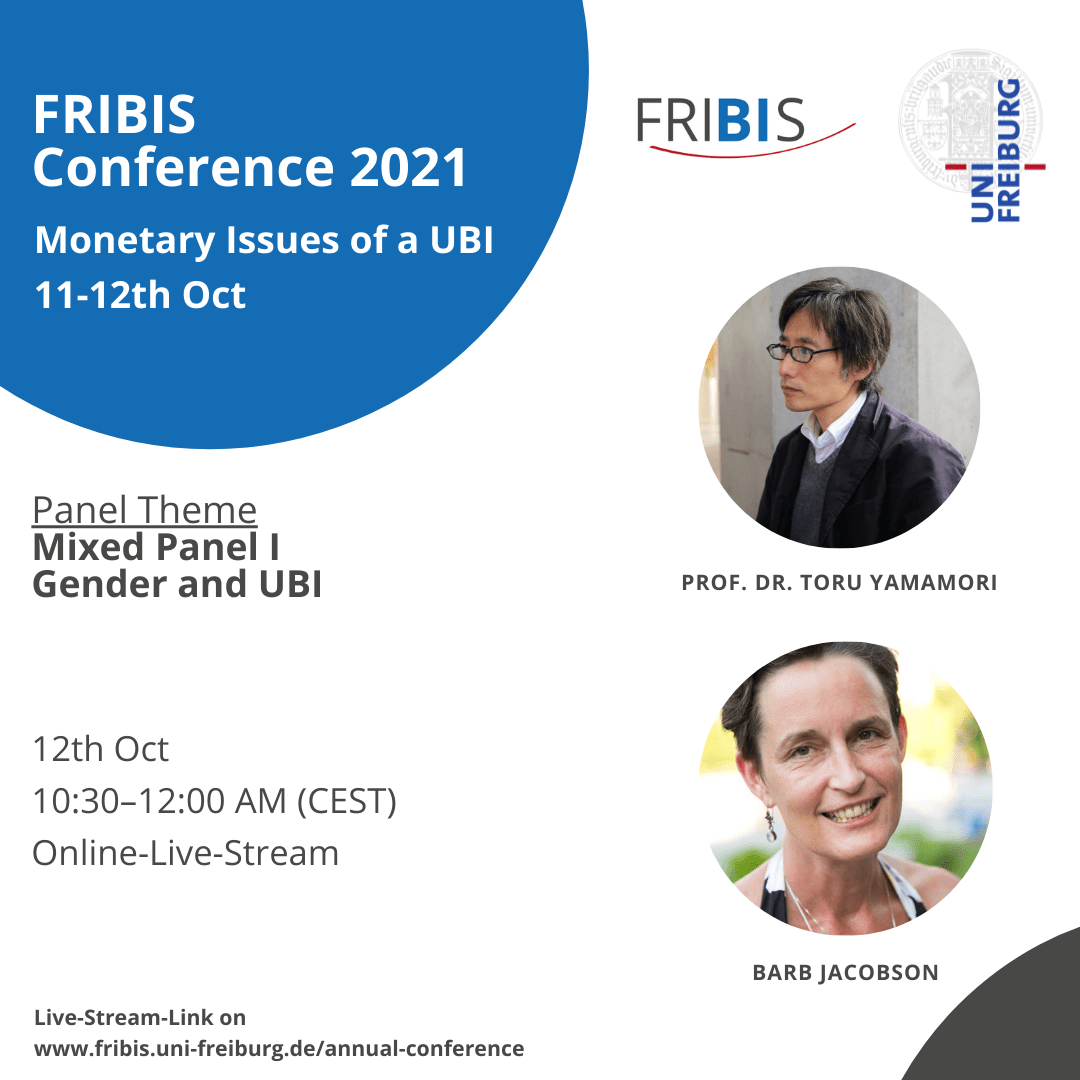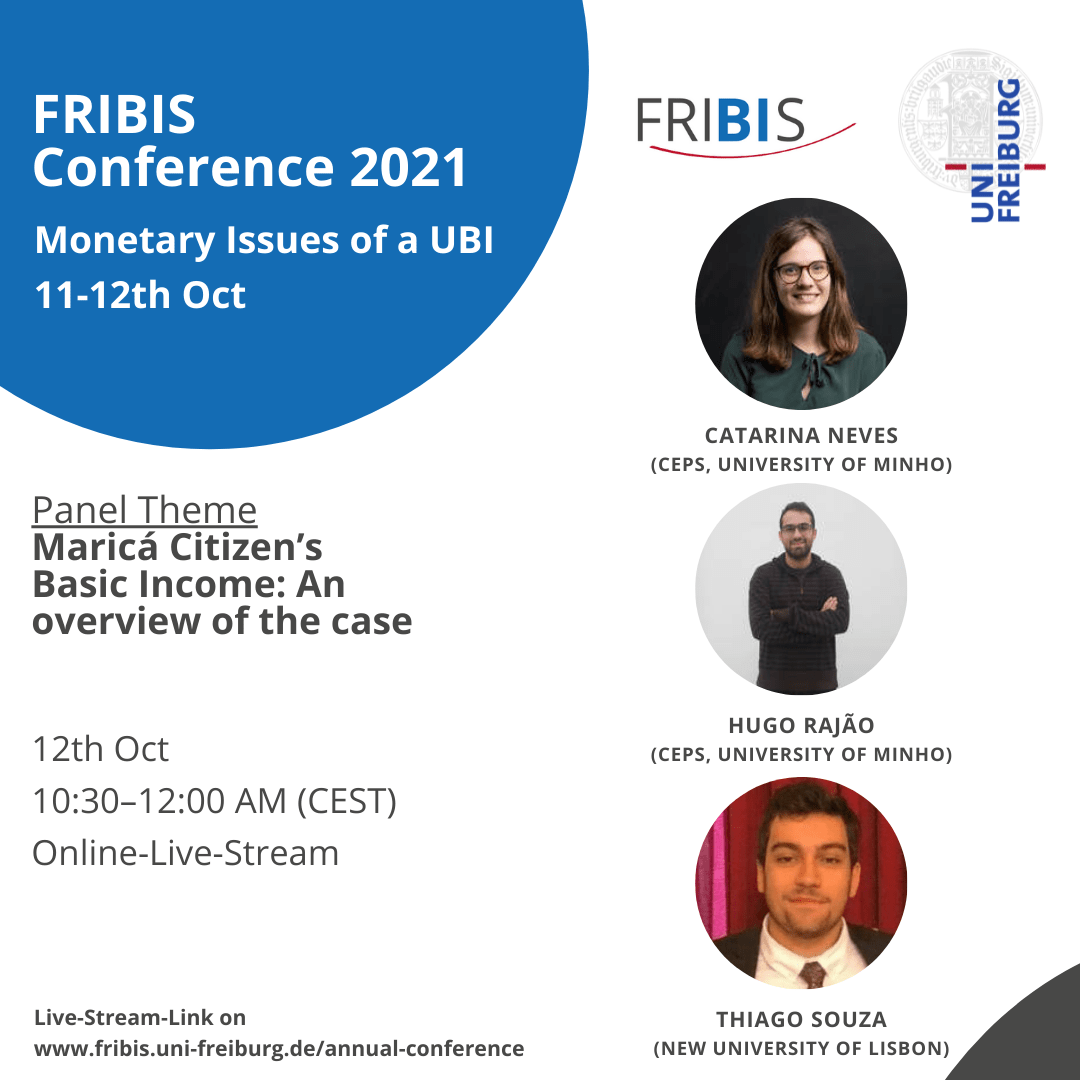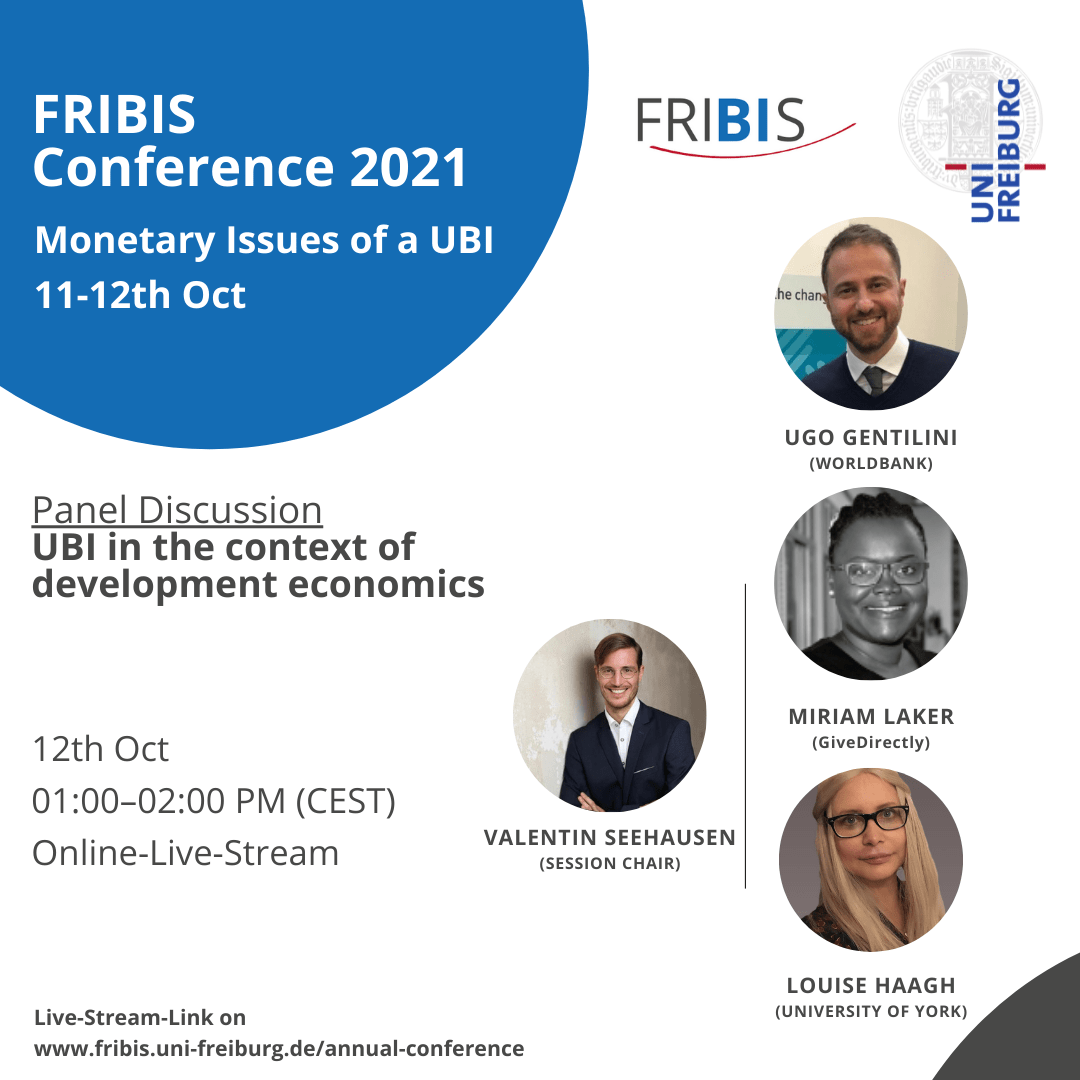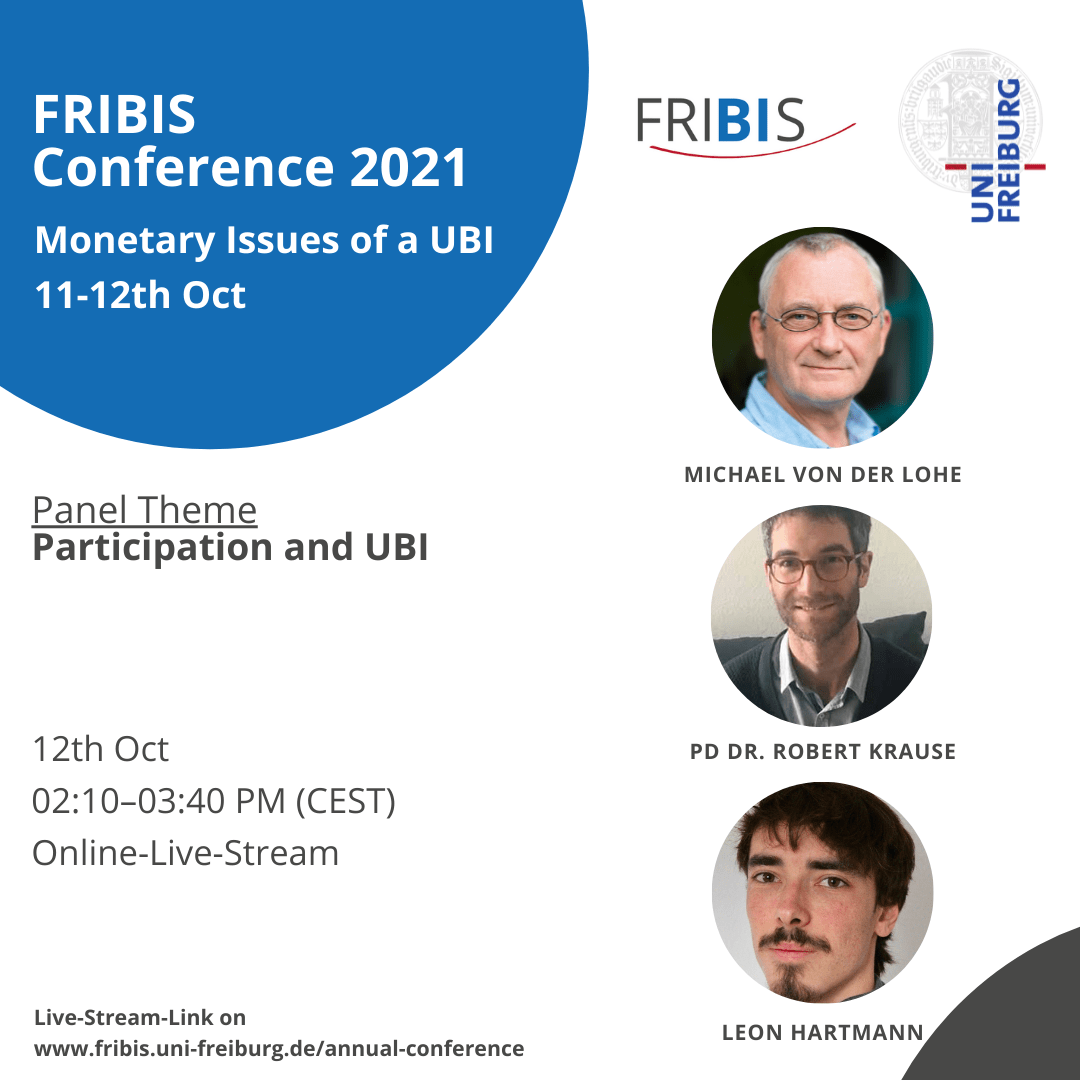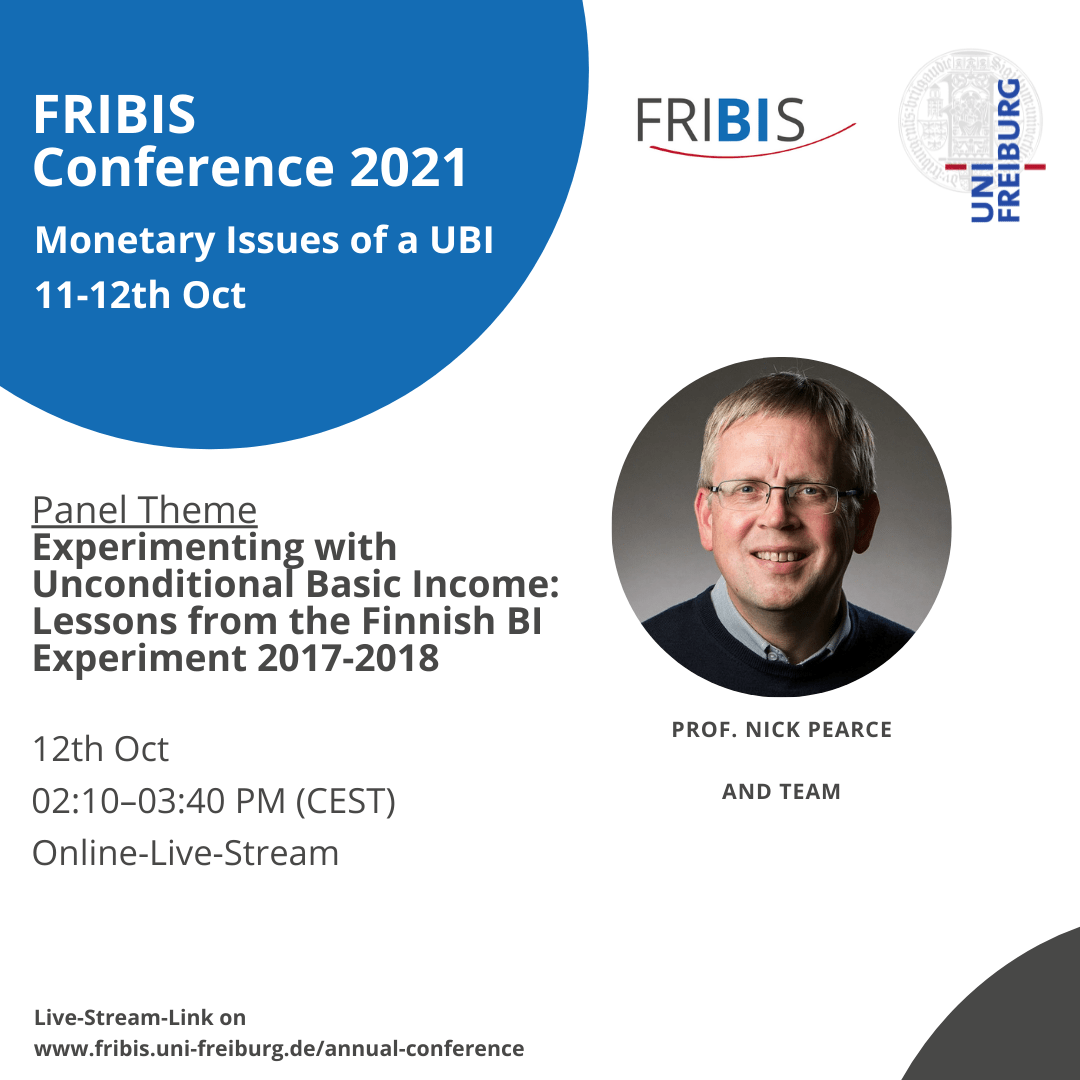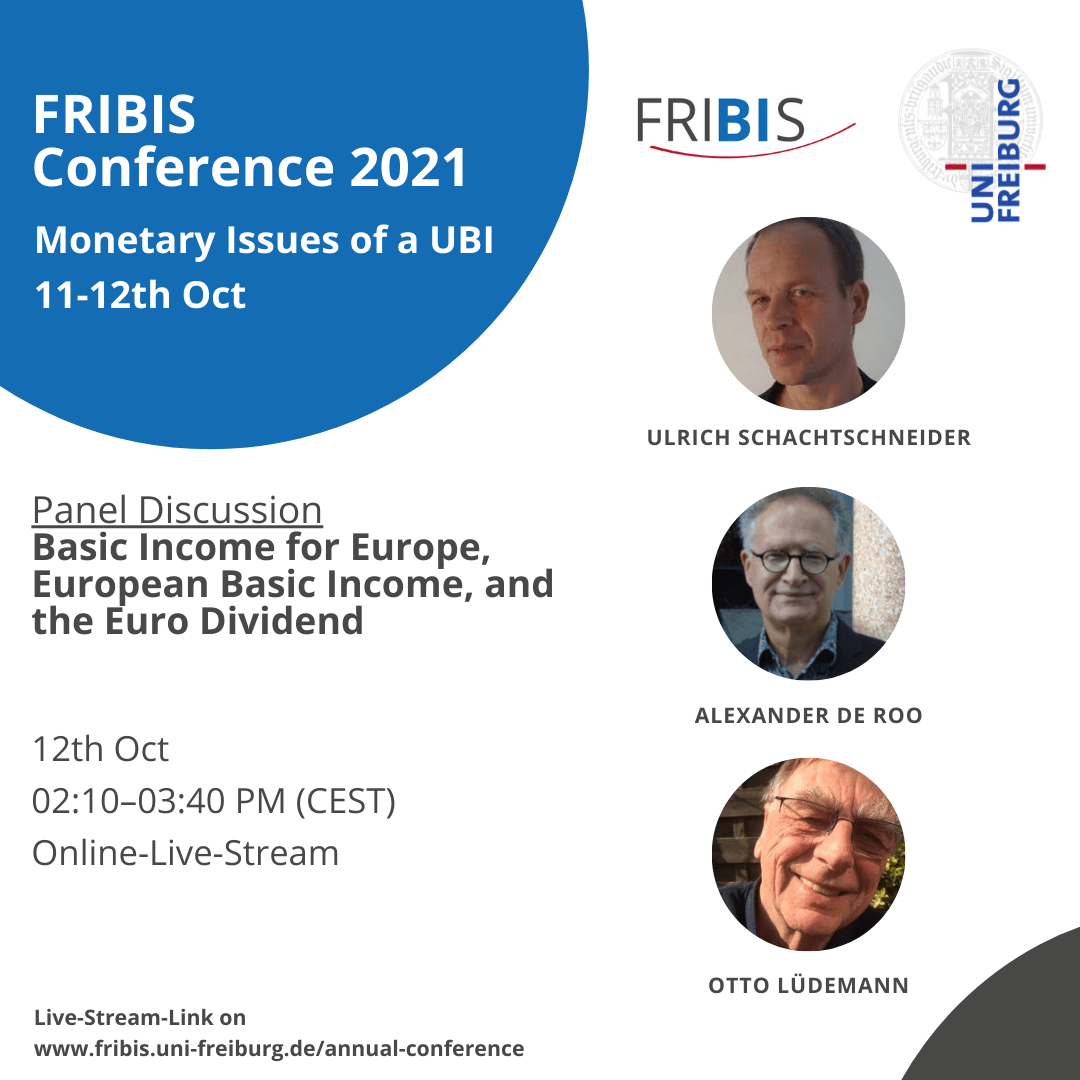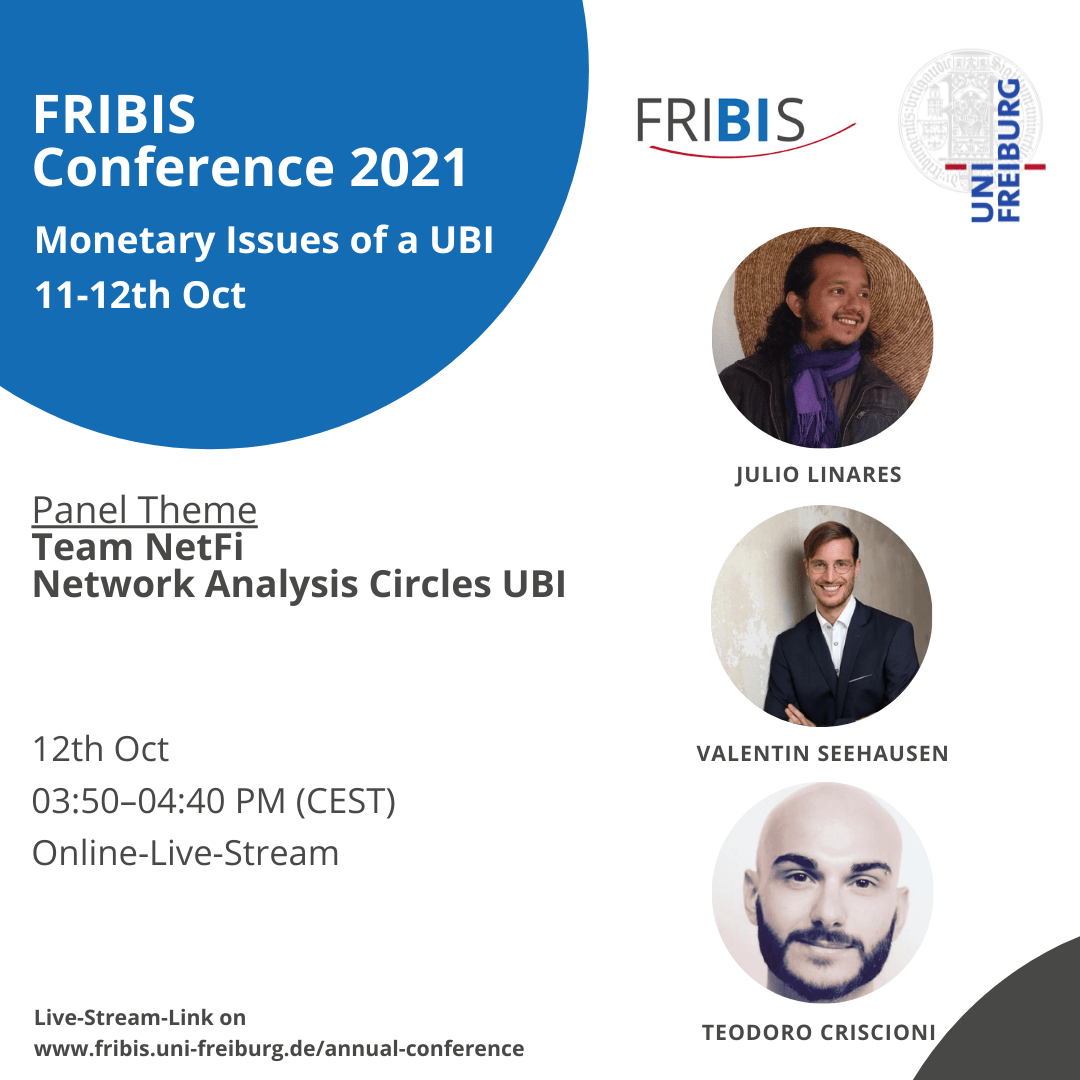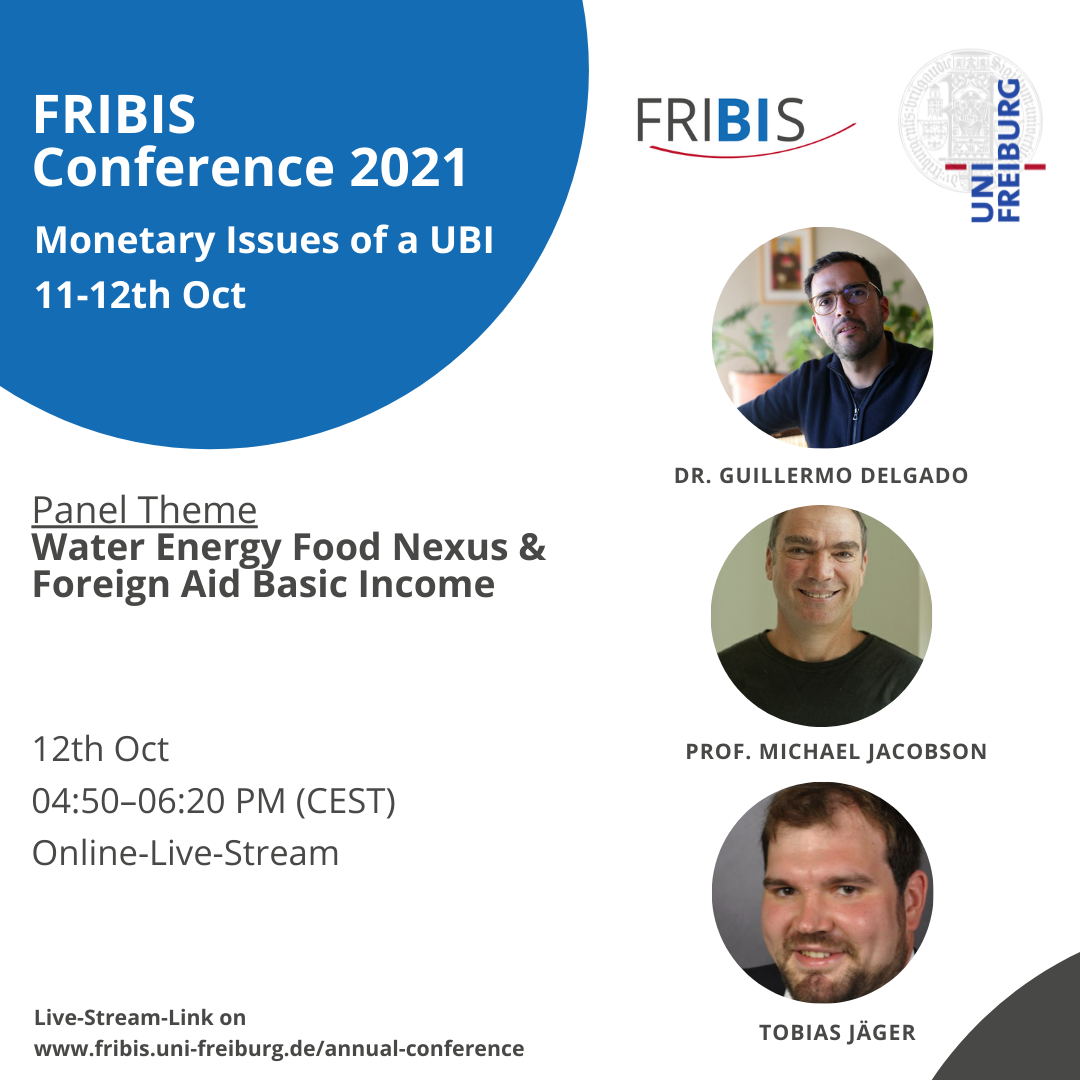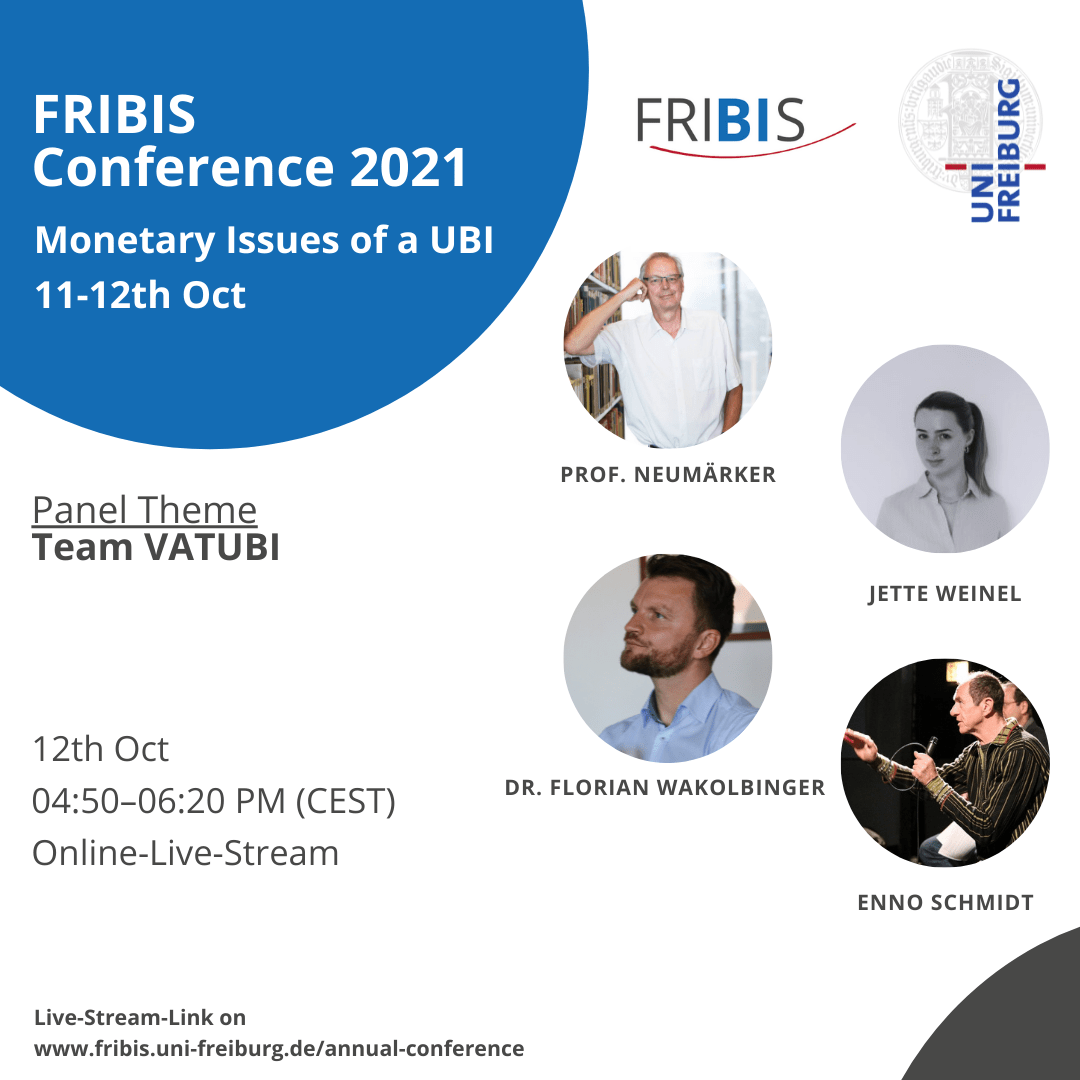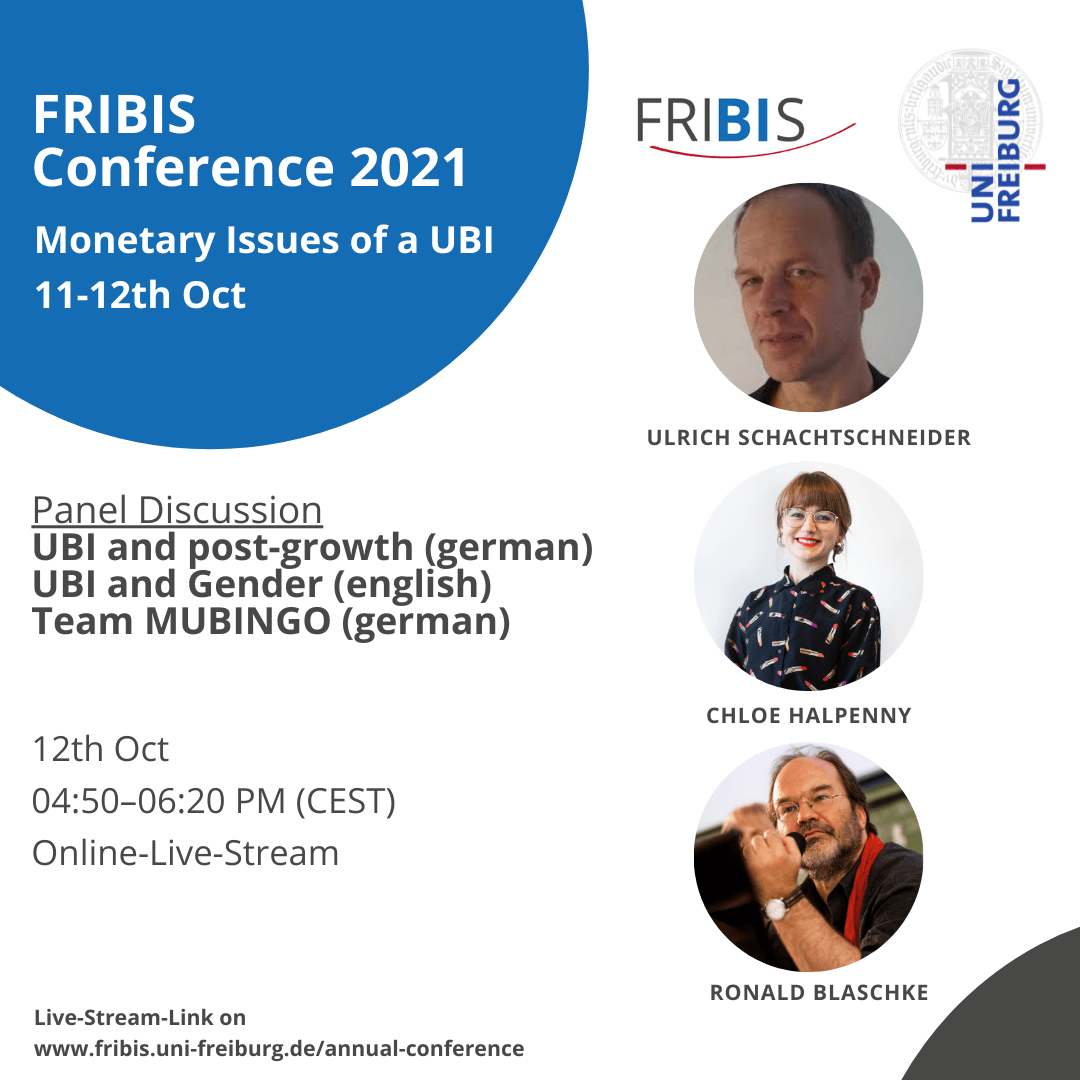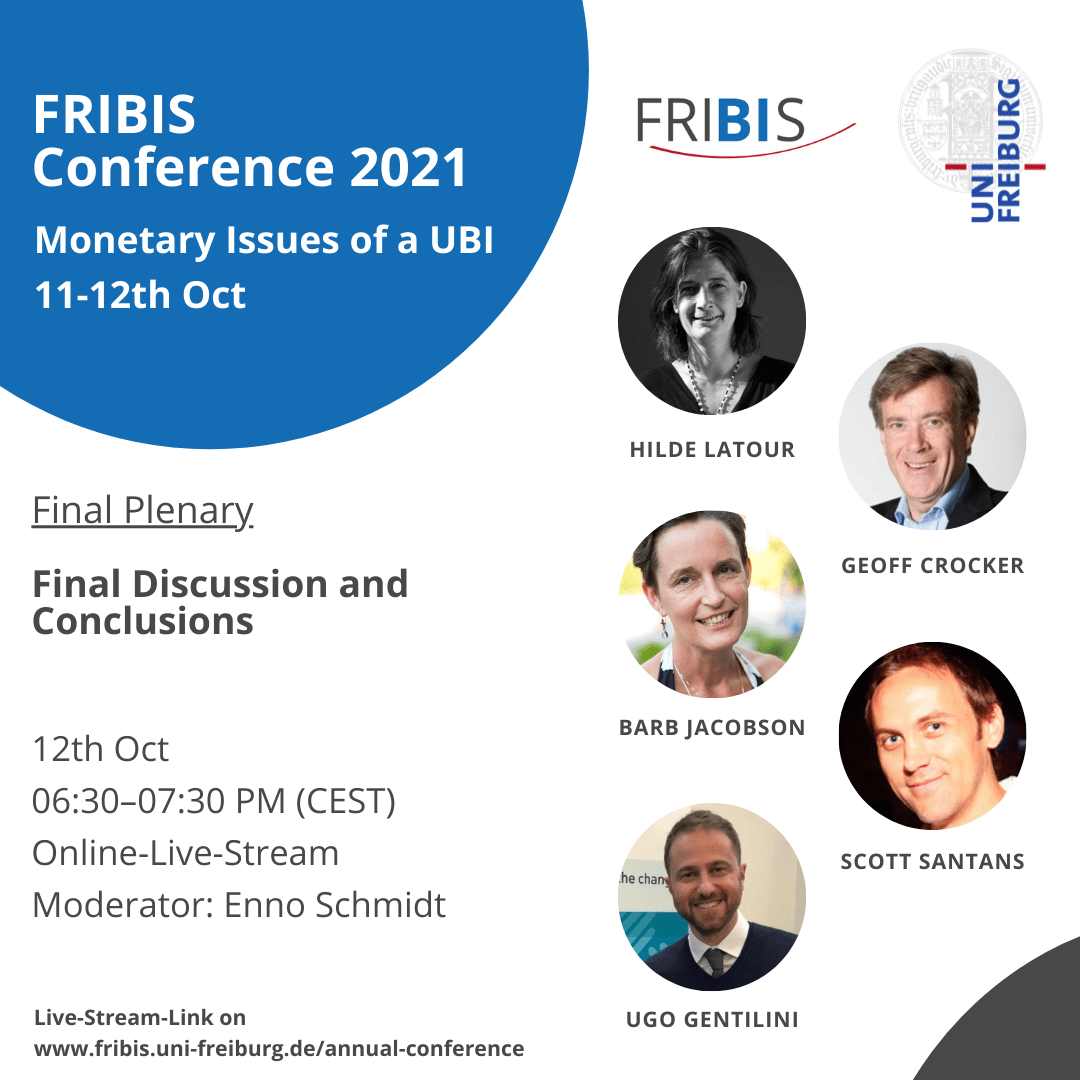FRIBIS Annual Conference 2021
The monetary issues of a UBI
This year, the FRIBIS conference will shed light on an emerging topic in economics of UBI: the monetary issues of a UBI. Monetary aspects are becoming more important due to an increasing economic interest in monetary innovations and major disruptions in central banking and finance.
UBI research is being increasingly influenced by this development. The biggest UBI pilots use specifically minted currencies to ensure local spending, and new strands of transformative economics propose monetary financing or community currencies as financing mechanisms for a UBI.
FRIBIS acknowledges this evolution by creating research teams in order to keep up-to-date with research in this field. At this year’s conference, FRIBIS will present this teams’ research, as well as other research activities. Since FRIBIS teams are made up not only of scientists, but also of civil society actors and activists, the latter will also be able to show their contribution potential. In addition, research collaborations will be presented and there will be keynotes and panel discussions with our distinguished guests.
The conference will be held online. It will be livestreamed over the FRIBIS YouTube channel. Guests are invited to ask questions in the YouTube Chat.
Monday, October 11th
2:00 – 2:30 pm (CEST)
Plenary Session I: Welcome Address — the Increasing Importance of Monetary Issues for UBI
Speaker: Bernhard Neumärker
Session Chair: Valentin Seehausen
Show more
Bernhard Neumärker will welcome all participants on behalf of FRIBIS, and Valentin Seehausen will introduce the conference topic “monetary issues of a UBI”
2:40 – 4:10 pm (CEST)
Plenary Session II: Monetary Issues of UBI I — Debt-Free Sovereign Money UBI
Speakers: Geoff Crocker, Aida Garcia Lazaro, Alex Howlett
Session Chair: Valentin Seehausen
Team: FUBI
Show more
This team researches the macroeconomic feasibility and implications of a basic income funded by debt-free sovereign money. This implies a new approach to government monetary and fiscal policy.
The team explores a revised economic theory of income, derived from an analysis of the changing structural sourcing of household income, using cross-sectional data from a number of country economies. The role of household debt in the income structure will be specifically analyzed. Basic income will then be proposed and tested in this changing income structure.
An exploration of the theory of money will examine claims that money is necessary debt, and derives its value from its acceptance to pay tax, compared to its acceptance to purchase goods and services.
The project methodology will include interactive engagement with academic economists, government economic officials, central banks, and economics think tanks. Existing and alternative models for funding flows will be developed, critiqued, and refined. The team will liaise with the macroeconomic and microeconomic simulation work based at IPR Bath, UK.
4:20 – 5:50 pm (CEST)
Parallel Sessions I
Bargaining Theory and UBI, and Experience in North Ireland and Sri Lanka
Session Chair: Tobias Jäger
Team: Basic Income for Peacebuilding
Show more
At the Basic Income for Peacebuilding panel, Marcel Franke and Tobias Jäger will talk about “Basic Income meets Bargaining Theory”. Subsequently, Patrick Brown will talk about Northern Ireland and his research activities, and most likely there will be a presentation by Selvi Sachithanandam or Sarath Davala on Sri Lanka.
Social Contract and New Ordoliberalism
Speakers: Otto Lehto, Lida Kuang, Bernhard Neumärker
Session Chair: Lida Kuang
Team: SoCoBis
Show more
It is not enough for the study on basic income to stay in the theoretical stage. The team SoCoBis aims to carry it out in the laboratory. This presentation addresses the experimental research of socially acceptable conditions and rules for a basic income society.
The first part of the presentation will be given by Otto Lehto. He will focus on why we should consider the UBI as permanent crisis management and the rule of law. Then Lida Kuang will share her thoughts on how to justify the basic income experiments. Also, she will follow up with a designed experiment and analysis. As the ending part, Bernhard Neumärker will introduce the logic of Social Contracting and “New ordoliberalism” for research and implementation of UBI.
• Otto Lehto: UBI, Permanent Crisis Management, and the Rule of Law.
• Lida Kuang: UBI as a form of social contract: an experimental approach.
• Bernhard Neumärker: The Logic of Social Contracting and “New ordoliberalism” for Research and Implementation of UBI.
Introducing UBI on a Communal Level
Speakers: Simon März, Team Expedition Grundeinkommen
Session Chair: Simon März
Team: XUBI
Show more
Simon März: Financing UBI through the federal fiscal equalisation scheme.
Team Expedition Grundeinkommen E.V.: Outlay of their work in lobbying for the funding of UBI model experiments in different cities in Germany.
UBI has received a lot of attention in recent years. Yet, for all of its potential there is very little to no cohesive research done on UBI, even much less so in Germany. This is why the Team Expedition Grundeinkommen E.V. has taken it upon itself to make exactly that happen. They toil to see the realization of government funded UBI model experiments in different major cities in Germany. Even though there is still a lot of work and challenges ahead of them, they have had remarkable success, especially in the German city states, and are convinced to see their efforts rewarded in the nearer future.
With the introduction of UBI experiments on a communal level, one question that always arises is the question of how a city can raise funds to fund a citywide UBI experiment. One proposed solution is often to simply raise new taxes. However, this is always much easier said than done. Another, and very feasible option, to fund communal UBI experiments, is the diverting of funds from the federal fiscal equalisation scheme in federalist countries towards paying for a communally run UBI experiment. Simon März will elaborate on the pros and cons, by closely examining the German federal fiscal equalisation system, of this funding possibility. He, furthermore, will dive into its feasibility and discuss different questions that arise with the realisation of such a funding option.
6:00 – 7:00 pm (CEST)
Plenary Session III: Keynote – “Battling Eight Giants: Basic Income Now”
Speaker: Guy Standing
Session Chair: Bernhard Neumärker
Show more
Today in one of the richest countries in the world, 60% of households in poverty have people in jobs, inequality is the highest it has been for 100 years, climate change threatens our extinction and automation means millions are forced into a life of precarity.
The solution? Basic Income. Here, Guy Standing, the leading expert on the concept, explains how to solve the new eight evils of modern life, and all for almost zero net cost. There is a better future, one that makes certain all citizens can share in the wealth of the modern economy.
Far from being a new idea, Standing shows how the roots of basic income go back to the Charter of the Forest, one of two foundational documents of the state — the other, sealed on the same day, being the Magna Carta.
All citizens have a right to the wealth created by capitalism, and all — left or right, rich or poor — can benefit from a dynamic and ecologically grounded economy created by the guarantee of subsistence to all.
Tuesday, October 12th
10:00 – 10:30 am (CEST)
Plenary Session IV: Monetary Issues of a UBI II — Empirics from Pilots
Speakers: Young Seong Yoo, Andreu Honzawa
Session Chair: Valentin Seehausen
External Cooperation:: BIRAL
Show more
This session will shed light on why it is important to collect data with UBI pilots and how this can be done. Young Seong Yoo from the Geyonggi Research Institute (GRI) will address some words on the importance of the collaboration of FRIBIS, GRI and other institutes under the name of BIRAL (Basic Income Research and Action Lab). In addition, he will ask why they use a local currency for distributing an UBI to more than 50,000 people. Andreu Honzawa will tell about a local currency in Kenya, which addresses a UBI from the perspective of a community currency.
10:30-12:00 am (CEST)
Parallel Sessions II
Transitional Forms of UBI in Russia
Speakers: Vyacheslav Bobkov, Elena Odintsova, Alexandra Pilyus
Session Chair: Alexandra Pilyus
Team: UBI Russia
Show more
Gender and UBI
Speakers: Toru Yamamori, Barb Jacobson
Session Chair: Rejitha Nair
Team: UBIG
Show more
Toru Yamamori from Kyoto (Gender Team) will speak about “Grassroots Feminist Economic Thought at the Intersection of the Women’s Liberation Movement and the Claimants Unions Movement”: Based on his oral historical research on a group of women who succeed to make Basic Income as one of official demands of the British Women’s Liberation movement, he is currently trying to reconstruct their forgotten voices and struggles as a grassroot feminist economic thought.
Barb Jacobson has experience on both sides of the UK welfare system, as a claimant and advisor, as well as working in a variety of other jobs. She has organised around women’s, health, welfare, and housing issues for over 35 years. Barb is a board member of Basic Income UK, and was the founding Chair of Unconditional Basic Income Europe from 2014 to 2017. She is also currently News Editor of BIEN.
Barb will make a presentation on UBI and gender, based on her nine-year experience with the Wages for Housework campaign and later historical research, and another one on a philosophy of money and value based on her reading of and work with David Graeber + unpaid campaigning experience around monetary reform.
UBIEXP: UBI empirics and theories from real-world pilots
Speakers: Catarina Neves (CEPS, University of Minho), Hugo Rajão (CEPS, University of Minho), Thiago Souza (New University of Lisbon)
Session Chair: Stefano Calboli ( Ceps, university of Minho)
External cooperation: UBIEXP
Show more
This panel aims to address the Citizen’s Basic Income created in the city of
Maricá (Brazil). To achieve that end, geopolitical aspects of the Brazilian city are highlighted, and the genesis of the BI program is described, as well as its development since its creation in 2013. Besides, the importance of the program during the Covid-19 Pandemic is considered. Finally, some implications and related outcomes of this Basic Income case are brought up and open to debate. Catarina Neves will speak about “Obligations from the norm of reciprocity: Is a Unconditional Basic Income permissible?”. The abstract of her talk is as follows:
Assuming as given that distributive justice should be at least partly conditioned by cooperation, this presentation will start off by discussing a broader view of what the norm of reciprocity should entail: it will start off by considering reciprocity as a relational value, hence as constitutive of relationships between people. Secondly, it will consider how reciprocity might be seen as both civic and economic reciprocity (when it comes to relationships among people in a given political society). Whereas the first is about our obligations as citizens (abide by the law, vote and take part in political decisions), the second is about our obligations as economic agents, which might include trading and participating in the market, but also work and productive contribution. The first is usually considered to include the second, but it does not have to follow necessarily. Hence, our obligations as citizens do not necessarily need to include our contribution as productive agents (e.g. work, or performing productive contribution) and demanding it might be a contextual claim. Hence, the requirement
Finally, the presentation will close by discussing whether the concept of economic reciprocity is sound. By comparing reciprocity as a norm and social mechanism, with the concept of redistribution, the paper will close by arguing what we are claiming for when discussing economic reciprocity (e.g. demanding economic productive contribution from each individual) serves the purposes of redistribution, and not the demands of reciprocity, and hence it is governed by distinct mechanisms, and different claims, which are not incompatible, quite the opposite, with a claim for Unconditional Basic Income.
12:00-1:00 pm (CEST)
Break
1:00 – 2:00 pm (CEST)
Plenary Session V: Panel Discussion — UBI in the Context of Development Economics
Speakers: Ugo Gentilini (Worldbank), Miriam Laker (GiveDirectly), Louise Haagh (University of York)
Session Chair: Valentin Seehausen
Show more
In our first panel discussion on October 12th we invited researchers that are highly involved in UBI pilots all over the world. They will present us findings from their field work and will then discuss the tool of UBI for development. Miriam Laker will present the last results of GiveDirectly which involve 10 RCT experiments, Louise Haagh will present her findings of the survey about economic security. Ugo Gentilini will join the discussion with a perspective from the World Bank.
2:10 – 3:40 pm (CEST)
Parallel Sessions III
Participation and UBI
Speakers: Michael von der Lohe, Leon Hartmann
Session Chair: Milan Wenner
Team: Participation and UBI
Show more
The team “Participation and UBI” investigates how the ideas of participation and basic income have grown historically and how they are discursively connected. The activist part of the team advocates direct democracy in the form of referendums and sees basic income as a lever for citizens to participate more in democratic processes. Leon Hartmann will talk about his research project “Universal Basic Income as a discursive space of the future”. Drawing on considerations of Joseph Beuys, Michael von der Lohe, founder of “Omnibus für direkte Demokratie”, will give a lecture on “Basic Income — a corporation of the Social Sculpture”.
Experimenting with UBI: Lessons from the Finnish BI Experiment 2017-2018
Speakers: Olli Kangas, Nick Pearce
Session Chair: Nick Pearce
Team: Microsimulation
Show more
Professor Olli Kangas was a key figure in planning, implementing, and evaluating the nationwide Finnish basic income experiment of 2017-2018. With colleagues from the Social Insurance Institution of Finland (KELA), he will discuss the design, implementation process and results of the basic income experiment in relation to employment, health and well-being, and trust, drawing on his recently co-edited book Experimenting with Unconditional Basic Income. He will also discuss what the political feasibility of basic income proposals. The session will be moderated by Professor Nick Pearce of the Institute for Policy Research, University of Bath.
3:50 – 4:40 pm (CEST)
Plenary Session VI: Monetary Issues of UBI III — Network Analysis Circles UBI
Speakers: Julio Linares, Teodoro Criscioni, Aleeza Howitt, Gustav Friis
Session Chair: Valentin Seehausen
Team: NetFi
Show more
The Network Analysis and Financial Diaries (NetFi) team researches complementary and community currencies that use an Unconditional Basic Income as a distribution mechanism. As a methodological team, NetFi develops, among other things, programs and procedures that can be used to research these currencies. It is currently developing three different software solutions for this purpose — including a program that can be used to analyze graph-based network data.
4:50 – 6:20 pm (CEST)
Parallel Sessions IV
Concepts and Relationship of Water Energy Food Security and Foreign Aid Basic Income
Speakers: Tobias Jäger, Michael Jacobson, Guillermo Delgado
Session Chair: Tobias Jäger
Team: WEF_FABI
Show more
Tobias Jäger will give a short introduction to the team and then present his research idea “Social accounting matrix and Foreign Aid in Namibia”. Guillermo Delgado will give a presentation on the report he co-authored Evaluation of the Namibia Basic Income Grant and Emergency Income Grant. Mike Jacobson will give an introduction to the water-energy-food nexus.
On the Merits of VAT-Financed UBI
Speakers: Jette Weinel, Bernhard Neumärker, Florian Wakolbinger, Enno Schmidt
Session Chair: Enno Schmidt
Team: VATUBI
Show more
Florian Wakolbinger ist an economist focusing on regional economics as well as tax- and social policy. In the past he has been involved in a number of simulation studies featuring regional economic impact as well tax- and social policy reforms in Austria. Some of those studies featured the (hypothetical) introduction of an Unconditional Basic Income in Austria.
Abstract of Florian Wakolbinger: In this study, we investigate how introducing an Unconditional Basic Income (UBI) and — at the same time — shifting the tax system from income taxation to the taxation of consumption would impact tax revenue and consumer prices. As we see, the development of wages after an introduction of an UBI is critical. We don’t model this development explicitly, however, we compare various scenarios. We do our calculations for Austria as well as Germany and compare the results.
Abstract of Bernhard Neumärker and Jette Weinel: We investigate the Laffer curve of the consumption tax with an underlying UBI in a neoclassical model. Thereby a utility function adapted to the UBI is crucial. Furthermore, financial capacity may change due to public budget constraints based on different fiscal policy proposals.
Enno Schmidt, research associate at the Götz Werner Chair, will talk about the advantages of the value-added tax and why it is suitable for financing an unconditional basic income.
Mixed Panel — "Come and live in these boots first:" Leveraging lived experience to inform feminist basic income debates, and Political and social UBI-movements in Germany and the EU, and Grundeinkommen und Postwachstum
Speakers: Chloe Halpenny from Ottawa (Gender Team),
Ronald Blaschke (Team MUBINGO), language: [German],
Ulrich Schachtschneider (Team UBIE), language: [German]
Session Chair: Franziska Leopold
Show more
“Come and live in these boots first:” Leveraging lived experience to inform feminist basic income debates
Chloe Halpenny (Ottawa) is part of the research team of “UBI and Gender”. She is a social policy researcher at the Social Research and Demonstration Corporation, and co-chair and co-founder of the Basic Income Canada Youth Network. In her presentation, she will share some of the findings from her MPhil research at the University of Cambridge, describing what the experiences of participants in the Ontario Basic Income Pilot bring to feminist debates about basic income.
Political and social UBI-movements in Germany and the EU
-this presentation will be held in German-
Ronald Blaschke (MUBINGO team) will give an informative lecture on the debates on basic income in various social movements as well as an overview of the positions of political parties in Germany and possibly, on the sidelines, a report on the European Citizens’ Initiative “Unconditional Basic Income (UBI) throughout the EU” (ECI UBI).
Grundeinkommen und Postwachstum
-this presentation will be held in German-
Grundeinkommen als ökonomische und soziale Basis-Sicherheit ist (auch) ein Kulturimpuls. Welche Zusammenhänge könn(t)en reklamiert werden zwischen Grundeinkommen und Postwachstum?
6:30 – 7:30 pm (CEST)
Plenary Session VII: Closing Discussion
Discussants: Geoff Crocker, Hilde Latour, Barb Jacobson, Scott Santens
Session Chair: Enno Schmidt
Show more
In the final session we invite these renown UBI experts and experts on social protection to get to the heart of their view on funding a UBI.
What is most desirable, what is most feasible, what innovations in the monetary system offer new solutions?
